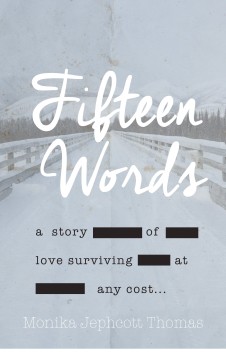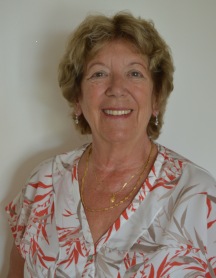Today I have the joy of hosting Monikka Jephcott Thomas as part of the 12 Days of CLink Christmas! I hope you enjoy the post which describes the inspiration behind her brilliant book ‘Fifteen Words’.

The inspiration for FIFTEEN WORDS
I was doing some research into my family history, as most of us do at some stage of our lives and, also as most of us do whose parents grew up during the world wars, I felt their stories were the stuff of novels. Unlike many who will be reading this however, my parents were both German. They met during the Second World War and were eventually separated by it, as Max and Erika are in the novel – my father having to go off and serve as a doctor in the German army, not because he wanted to (he was not a supporter of the Nazi party), but because he was conscripted, like so many young men across the globe in the early ’40s.
The novel is heavily inspired by the real-life trials and tribulations of my parents’ early married lives – simply because they are so inherently dramatic – whilst allowing me to depict the complexity of growing up in Nazi Germany among the potent forces of religion and fascism competing for young souls. It is also an exploration of the strength of human relationships, which the war tested greatly, in an age when letter writing was one of the few long distance forms of communication available to most; when the fighting separated husbands and wives, children and parents for extensive periods of time and over vast distances.
In the book, Max is a POW in a Russian labour camp on the edge of the Arctic for four long and painful years. I was shocked to find out, during my research for this novel, that German POWs in those Soviet labour camps were only allowed to send letters home if they contained a maximum of fifteen words. So, in the novel, Max struggles over how to express everything he wants to tell Erika with such limitations. He enlists the help of his more artistic friends to help him. But finally in despair he writes something damning. It becomes one of the themes of the book: how we can say so much in so few words to beautiful or destructive effect.
The book was written reasonably quickly, in just a few months, but that was mainly because I was steeped in all the stories from the research I had already done into my family history, which had unearthed all manner of letters, documents, photos and tape recordings. The real work was deciding which stories to follow in the novel. Apart from the themes I wanted to explore, the stories I eventually focused on were also the most gripping, page-turning aspects of the history. So the book has its fair share of explosions, air raids, prison breakouts, emergency medical procedures on the battlefield, not to mention a pregnant woman hanging on to the outside of a speeding train!
Fifteen Words is however, primarily a love story. Anyone who likes World War 2 fiction will find it not only interesting but, I think, refreshing. This book is unusual in that there are not many books written in English about the German experience of WW2. Many early readers of the manuscript found it an eye-opener, informing them about the war in a way they never thought of before, without it being a text which tries to rewrite history. In no way does it attempt to say the Nazis weren’t to blame for the atrocities of the war, but it merely points out that not all Germans were Nazis. As with any war, which we see all too often today, there are many civilian casualties, from all strata of society. In this very human story I hope I have been able to reaffirm how all of us, from whatever nation, for all our differences, still suffer and rejoice in remarkably similar ways.
Want to know more?
Two young doctors form a profound and loving bond in Nazi Germany; a bond that will stretch them to the very limits of human endurance. Catholic Max – whose religious and moral beliefs are in conflict, has been conscripted to join the war effort as a medic, despite his hatred of Hitler’s regime. His beloved Erika, a privileged young woman, is herself a product of the Hitler Youth. In spite of their stark differences, Max and Erika defy convention and marry.
But when Max is stationed at the fortress city of Breslau, their worst nightmares are realised; his hospital is bombed, he is captured by the Soviet Army and taken to a POW camp in Siberia. Max experiences untold horrors, his one comfort the letters he is allowed to send home: messages that can only contain Fifteen Words. Back in Germany, Erika is struggling to survive and protect their young daughter, finding comfort in the arms of a local carpenter. Worlds apart and with only sparse words for comfort, will they ever find their way back to one another, and will Germany ever find peace?
Fifteen Words is a vivid and intimate portrayal of human love and perseverance, one which illuminates the German experience of the war, which has often been overshadowed by history.

Purchase on Amazon UK – CLICK click
Monika Jephcott Thomas grew up in Dortmund Mengede, north-west Germany. She moved to the UK in 1966, enjoying a thirty year career in education before retraining as a therapist. Along with her partner Jeff she established the Academy of Play & Child Psychotherapy in order to support the twenty per cent of children who have emotional, behavioural, social and mental health problems by using play and the creative Arts. A founder member of Play Therapy UK, Jephcott Thomas was elected President of Play Therapy International in 2002.

